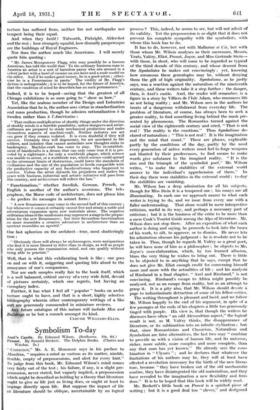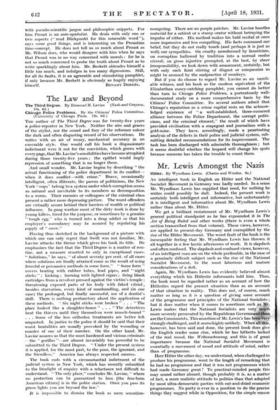Symbolism To-day
" Carriefsm," Mr. A. E. Housman says in his preface to Manilius, "requires a mind as various as its matter, nimble,
flexible, empty of prepossessions, and alert for every hint." To judge from this book, Mr. Edmund Wilson's mind comes very fairly out of the test ; his failure, if any, is a slight pre- possession, never stated, but vaguely implicit, a prepossession which might be described as holding by a theory that literature ought to give us life just as living does, or ought at least to impinge directly upon life. But suppose the impact of life on literature should be oblique, ascertainable by no logical process ? This, indeed, he seems to see, but will not admit of its validity. Yet the prepossession is so slight that it does not prevent his complete sympathy with the symbolists, with whom this book has to do.
It has to do, however, not with Mallarme et Cie, but with those whom Mr. Wilson analyses as their successors, Messrs.
Yeats, Valery, Eliot, Proust, Joyce, and Miss Gertrude Stein—
with those, in short, who will come to be regarded as typical of the third decade of this century, and whose descent from
the Syinbolistes he makes out convincingly ; yet, knowing how erroneous these genealogies may be, without denying them the gift of high originality. Symbolisme, as he justly
says, was a reaction against the naturalism of the nineteenth century, and these writers take it a step further : the danger, then, is Axel's castle. Axel, the reader will remember, is a figure in a story by Villiers de l'Isle Adam, who renounces life as not being reality ; and Mr. Wilson sees in the authors he treats of a dangerous withdrawal from everyday life. The problem of literature, of course, has always been to seek a greater reality, to find something living behind the mask pre- sented by phenomena. The Romantics turned against the social view of the eighteenth century and cried, " That is not
real ! The reality is the emotions." Thus Symbolisme de-
clared of naturalism : " This is not real ! It is the imagination and the mind that count." These are phases, explicable partly by the conditions of the day, partly by the need every generation of active writers must feel to forge weapons not blunted by their predecessors, to find means to make
words give Substance to the imagined reality. " It is the
aim and the triumph of the symbolist poet," Mr. Wilson writes, " to make the stabilities of the external world answer to the individual's apprehension of them." In their day there were stabilities in the external world ; to-day the stabilities are vanishing.
Mr. Wilson has a deep admiration for all his subjects, though for Miss Stein it is a tempered one ; his essays are all illuminating. In each one we approach nearer to what each writer is trying to do, and we issue from every one with a fuller understanding. That alone would be mere interpretive criticism, useful in its way, and perhaps a necessary part of criticism ; but it is the business of the critic to be more than a mere Cook's Tourist Guide among the Alps of literature. Mr.
Wilson does not stop there. After an exposition of what each author is doing and saying, he proceeds to look into the bases of his work, to sift, to approve, or to dismiss. He never lets his admiration obscure his judgment : he is resolute not to be taken in. Thus, though he regards M. Valery as a great poet, he will have none of him as a philosopher : he objects to Mr.
Joyce's over-elaboration, which, by too learned allusion, blurs the very thing he wishes to bring out. There is little to be objected to in anything that he says, except that he does not give Mr. Eliot enough credit for concerning himself more and more with the actualities of life ; and his analysis of Rimbaud in a final chapter, " Axel and Rimbaud," is not convincing. Rimbaud's escape to Africa might possibly be analysed, not as an escape from reality, but as an attempt to grasp it. It is a pity also, that Mr. Wilson should devote a page to indiscriminate detraction of some of his fellow-critics.'
The writing throughout is pleasant and lucid, and we follow' Mr. Wilson happily to the end of his argument, in spite of a few passages at the ends of his chapters a little too generously tinged with purple. His view is, that though the writers he discusses have often " an odd Alexandrian aspect," the logical result is not, as M. Valery thinks, the disappearance of literature, or its sublimation into an infinite stylization ; but that, since Romanticism and Classicism, Naturalism and Symbolism are false alternatives, the last two may " combine to provide us with a vision of human life, and its universe, richer, more subtle, more complex and more complete, than any that man has yet known." He already sees the com- bination in " Ulysses " ; and he declares that whatever the limitations of his authors may be, they will at least have effected a revolution necessary for the birth of the new litera- ture, because " they have broken out of the old mechanistic routine, they have disintegrated the old materialism, and they have revealed to the imagination a new flexibility and free- dom." It is to be hoped that this book will be widely read.
Mr. Beckett's little book on Proust is a spirited piece of writing ; but it is- a good deal too " clever," and disfigured with pseudo-scientific jargon and philosophic snippets. For him Proust is an auto-symbolist. He deals with only one or two aspects (" read Blickpunkt for this miserable word "), says some good things, and is interesting on the Proustian time-concept. He does not tell us so much about Proust as Mr. Wilson does, who would disagree with him when he says that Proust was in no way concerned with morals : for he is not so much concerned to probe the truth about Proust as to write sparklingly about him. Mr. Beckett obtrudes himself a little too much, and indulges in too many digressions. Still, for all its faults, it is an agreeable and stimulating pamphlet, if only because Mr. Beckett is obviously so hugely enjoying















































 Previous page
Previous page